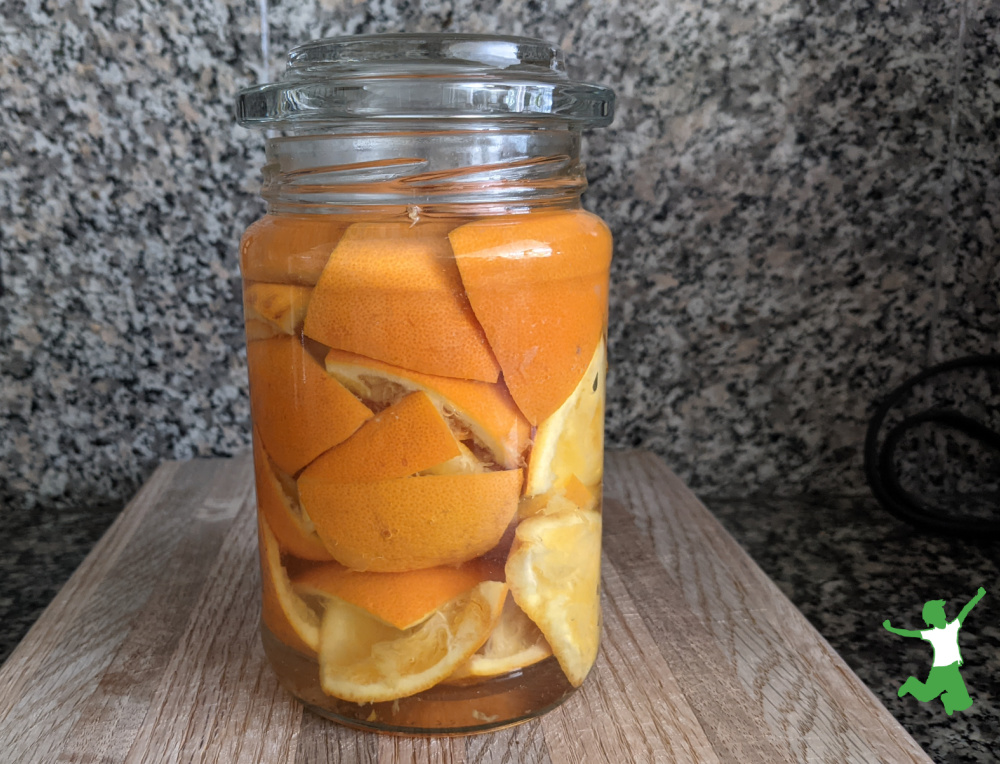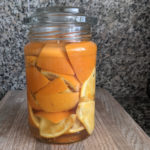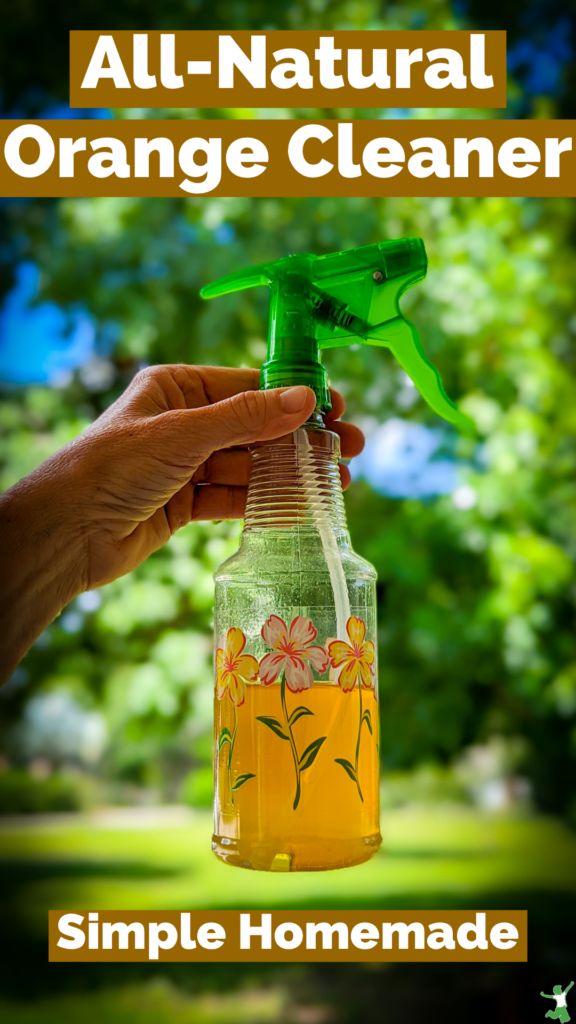Table of Contents[Hide][Show]
Homemade orange oil cleaner that is safe and nontoxic as an all-purpose cleansing solution for kitchen and baths. Works for windows too!

Commercially made citrus cleaners tend to be a pricey option for consumers seeking safe products for household cleaning.
And while many are marketed as natural, the labeling is evasive for the more popular brands, leading an analytical consumer like me to conclude that they contain chemicals just like more toxic alternatives.
For example, the product Citrus Magic contains the following ingredients:
Water, vegetable derived cleaners, natural and organic citrus oils, and sodium citrate.
Why aren’t the “vegetable-derived cleaners” specified by name?
Perhaps the complete list of ingredients is safe. More likely, however, they are not, else the company would be completely transparent about the specific names and list them on the label.
More consumers are realizing that making your own citrus all-purpose cleaner is worth the effort.
It takes little time, costs pennies per ounce, and is truly safe for children and pets. It also works just as well as commercial versions!
As a bonus, you get a pint or so of fresh orange juice for your efforts! This is because the process of making homemade citrus cleaners involves juicing the fruit first. Try this fermented orange juice recipe if you’d like to culture the OJ instead.
Then, instead of discarding or composting the peelings, you use them to make your citrus cleaner.
Why Orange Peel is Best for Homemade Cleaners
The grease and dirt-cutting orange oil is only in the peel.
The rind contains D-limonene, the naturally active ingredient. Note that it is not the same as orange essential oil.
While present in the peel of other citrus fruits like lemons, limes and grapefruit, D-limonene is especially concentrated in orange rind.
Hence, I would recommend using oranges only as substituting other citrus may negatively impact effectiveness.
How to Use
I use a spray bottle diluted 1:1 for quick cleanups in the kitchen and bathrooms.
It works for window cleaning too! No more holding your breath to avoid inhaling the toxic ammonia spray from commercial window cleaners!

Homemade All-Purpose Orange Oil Cleaner
Homemade citrus cleaner that is safe and nontoxic as an all-purpose cleansing agent for kitchen and baths. Cleans windows without streaks too!
Ingredients
- 6 medium oranges preferably organic or local
- 1/2 pint nonGMO white vinegar
Instructions
-
Wash oranges in warm, soapy water. Rinse well.
-
Slice oranges in half and remove pulp either with a hand press juice or a knife. Slice peels in half and pack tightly in a quart sized glass jar.
-
Fill the jar with white vinegar to just above the peels. Use a fermentation weight or a clean stone to keep the peels below the surface of the liquid.
-
Screw on the lid and leave on the counter for two weeks.
-
Strain the orange-infused vinegar and dispose of the peels (do not compost).
-
Dilute the vinegar with water 50-50 in spray bottles for nontoxic cleaning in the kitchen and bathrooms. Works for windows at the same or slightly lower dilution ratio (1:1 or 1:2).









can you use this to wash floors?
I haven’t used it for that purpose … might be a bit slippery from the orange oil.
With juicing, there is some pulp stuck to the inside of the peelings.
Is that ok?
WOW!!! This awesome recipe for cleaning orange oil just rawks my world. It smells divine and does such a fabulous job. I use it on windows, counter tops, bathroom, stove top, etc. Thank you, Sarah!! I appreciate you so very much. You are just the Cat’s Meow!!! I even added just a touch to some of my old kitchen towels on the final rinse. Woo-hoo….made me dance the happy dance while they were in the dryer.
Wow, great tip! Thanks for sharing 🙂
I am for sure trying this! I never thought an Orange could be so helpful, I bet it will make everything smell great.
I regularly do this with grapefruit peels and it works just as well I think and smells wonderful!
Great! Try it with orange peels next time and you may find it has even better dirt/grease cutting action as orange oil has significantly more D-limonene.
Do you stir at all during the 2 weeks or is a “set and forget” thing? Thank you!
Set and forget.
Hello Sarah,
Thank you for this recipe, I will definitely try it. My question is why not to compost the peels after soaking?
The reason you can’t compost the skins is because they are soaked with vinegar which would not be a good addition to the compost.
You could put them down your disposal. That’s what I do with leftover lemon and orange peels.
Thank you for sharing this recipe with us… I am definitely going to try it. I would be very interested to know why you can’t compost the skins after making the cleaning product from them.
You can’t compost the skins because they are soaked with vinegar and will sour the compost.